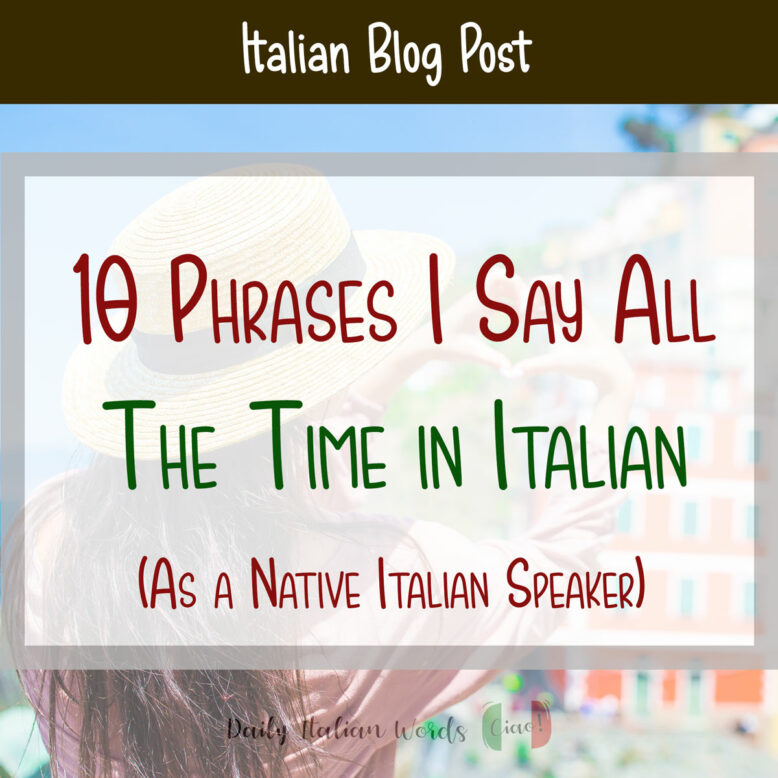We all have a personal set of words and phrases that we tend to use over and over again while talking. These are frequently influenced by local expressions, family habits, friends or even TV shows we enjoy. It is these phrases that characterise our speech and personalities.
If you are a learner of Italian, you may be interested in picking up a few of the common words and phrases in Italian that I say all the time as a native Italian speaker. I’ve also included some examples to give you a better idea of how I use them in everyday life. Let’s begin!

1. Come mai?
Meaning: How come?
This is an expression that that all Italians use in speech, not just me. Come mai is a lot like the question word perché (why), with the biggest difference being that perché can be both a question and the start of an answer or explanation, while come mai can only be used to start a question. By using come mai, you are showing interest in the other person’s reasons for doing something, with far less aggressive tone than perché.
- Come mai non sei venuto al cinema ieri sera?
- Why didn’t you come to the movies last night?
- Come mai sei così sudato?
- Why are you so sweaty?
2. Dai!
Meaning: Come on!
This is an expression that communicates exhortation and encouragement much like the English expression “Come on!”. I use it continuously, with both adults and children, but be careful not to use it with someone you don’t know very well: it can sound pretty rude!
- Dai, non è successo niente!
- Come on, nothing happened!
- Dai, andiamo!
- Come on, let’s go!
3. Cavoli
Meaning: Darn / Man / Jeez
Every language has its euphemisms to avoid vulgar words, and Italian is no exception. The word cavoli, which literally means cabbages, replaces a very common bad word and is used to express surprise or anger.
- Ho preso una multa, cavoli.
- I got a fine, darn.
- Sei sicuro di quello che dici? Cavoli, è assurdo.
- Are you sure about what you are saying? Darn, it’s absurd.
4. Che ne dici?
Meaning: What do you say? / How about…? / What do you think?
This is a very common way of saying “What is your opinion…?” in Italian and I always use it, especially when I want to suggest doing something.
- Che ne dici di ordinare una pizza stasera?
- How about ordering a pizza tonight?
- Che ne dici se organizziamo una partita di tennis?
- How about we organise a tennis match?
5. Bisogna
Meaning: Need / Have to
I normally use bisogna to say that there is something that needs doing without specifying who should take care of the task, hoping someone will take the initiative.
- Bisogna andare in banca.
- Someone needs to go to the bank.
6. Ti faccio uno squillo
Meaning: I’ll ring / call you
This is an expression I use several times per week towards my family and friends when I want to call them. Instead of the words chiamare (to call) or telefonare (to phone), I use the verb squillare (to ring). The verb “ring” refers to the sound of the phone ringing.
- Ti faccio uno squillo stasera.
- I’ll ring you tonight.
- Ti volevo proprio fare uno squillo.
- I really wanted to ring you.
7. Meglio tardi che mai
Meaning: Better late than never
I always use this phrase whenever I lose hope that something will happen, but it ends up happening in the end. And now that I think about it, I also use it as an indirect reproach when someone does something later than I’d hoped!
- Ah, sei arrivato, meglio tardi che mai.
- Ah, you’re here, better late than never.
- Ho ricevuto i soldi, meglio tardi che mai.
- I received the money, better late than never.
8. Che c’è?
Meaning: What is it? / What’s the matter?
The literal meaning of this phrase is “What is there?”, but I often use it as an abbreviation to ask if something has happened or to find out if there is a need for something. It is a colloquial expression to be used only with people you know well.
- Che c’è? Cosa ti serve?
- What is it? Do you need something?
- Ho capito, che c’è?
- I see, what’s the matter?
9. Non ci posso credere
Meaning: I can’t believe it
Whenever I am surprised, I always default to this expression of disbelief, most of all when I simply cannot believe what I am being told.
- Maria e Antonio hanno divorziato, non ci posso credere.
- Maria and Antonio got divorced, I can’t believe it.
- Non ci posso credere, ma sei sicuro?
- I can’t believe it, are you sure?
10. Che tonno (che sei)
Meaning: What a dolt (you are)
This is a very funny Italian expression that literally means “what a tuna you are”. I use it daily to refer to people who are gullible or who fail to do something that I consider a simple task. Why tuna, you might ask? Well, it was believed in ancient times that tuna were rather stupid, as they were easily lured into fishermen’s nets despite their large size.
- Che tonno che sei se pensi che ti inviterà al suo compleanno.
- You’re a real dolt if you think he’ll invite you to his birthday.
- Non riesci a svitare il tappo? Che tonno che sei.
- You can’t unscrew the cap? What a dolt you are.
Allegra Lucarelli, known professionally as allegraLu, is a certified Neurolanguage Coach for child bilingualism and a native Italian speaker who speaks English fluently. She helps families raise their children to be bilingual and multilingual at AllegraLu.com.


